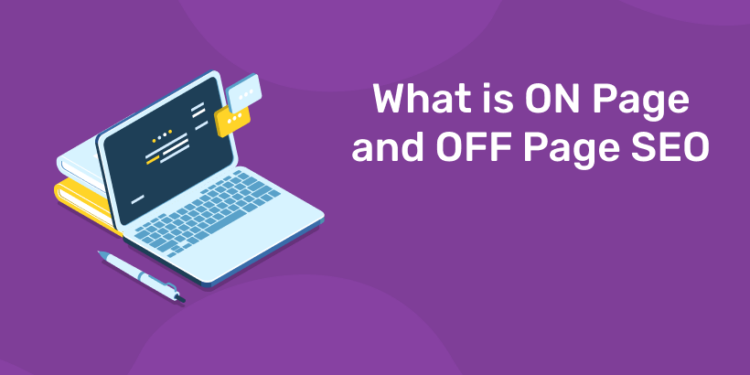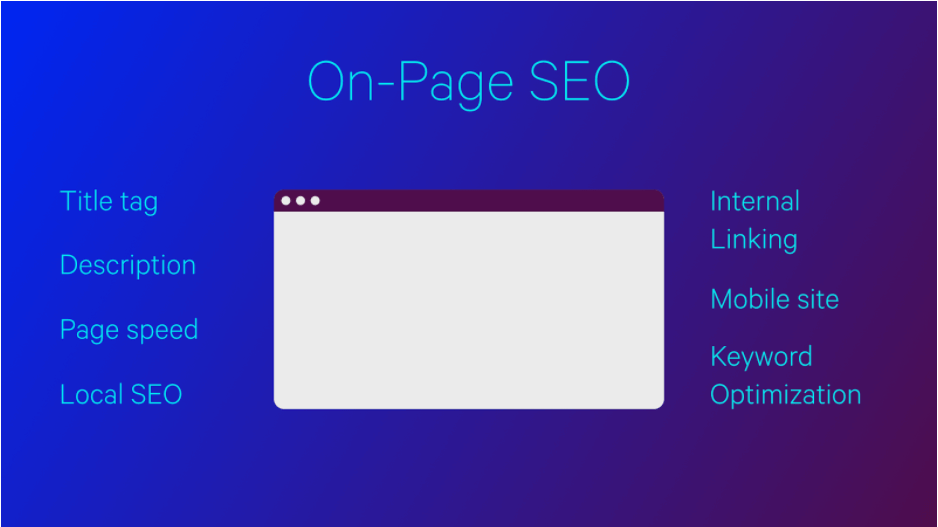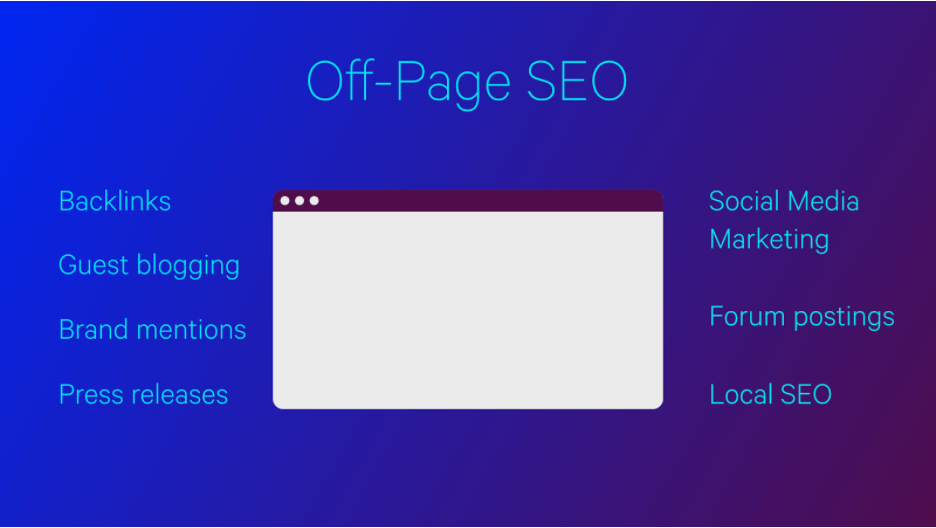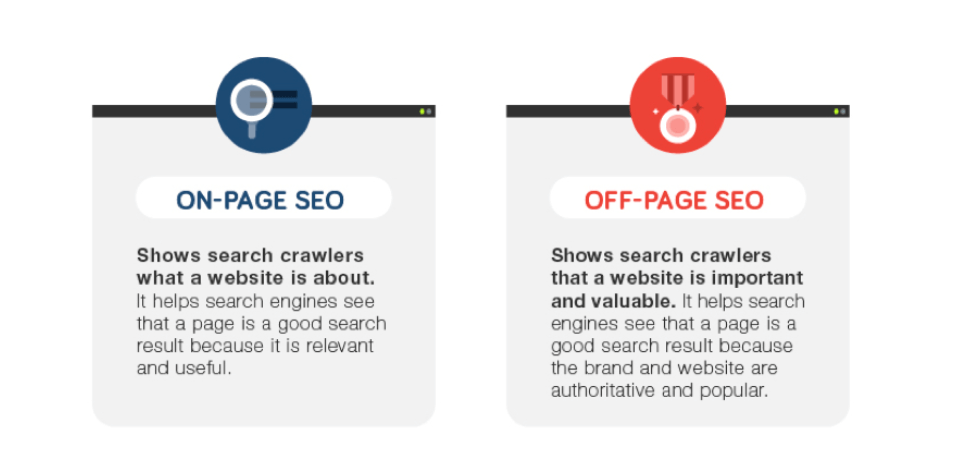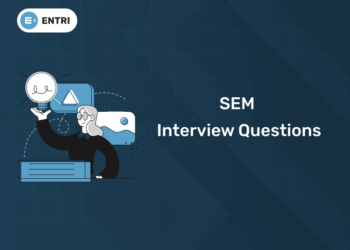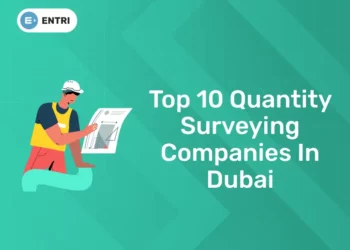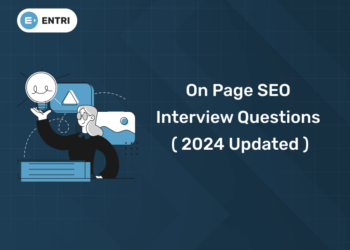Table of Contents
When it comes to SEO, there are two distinct branches to be addressed: on-page and off-page SEO. Both are important for success in search engines.
However, they both help your site in different ways.
On-page vs. Off-page SEO (+ Why is it important?)
The importance of these factors for search engine optimization is pretty simple:
A good SEO strategy considers both on and off-page factors.
Let me explain:
- It’s not enough to have quality content. You won’t rank just by finding the right keywords and jamming them into an article.
- You need to create great content people can find and will share. Get people to find and share your content, and follow up with people who want the change you offer.
- It’s time to think about how to acquire high-quality backlinks and get your readers to share your content with their networks (for both backlinks and social shares).
Entri gives you the best Coding experience
Let’s take a look at each search engine ranking tactics in more detail:
What is on-page SEO?
On-page SEO is the range of possible actions you can take on individual pages to optimize their reach.
Some basic on-page factors to optimise as part of your marketing strategy include:
- Meta tags (title tags and meta descriptions)
- Internal linking (+ anchor texts)
- Image SEO ( ALT texts)
On-page optimization can go further than that though:
Things like matching keywords to search queries, finding missed opportunities and new keywords to target through a competitor keyword analysis, all the way to technical things like page load optimizations and fixing broken links.
The technical side of on-page SEO primarily focuses on making sure your content is as accessible as possible for both people and crawlers.
Advantages of on-page SEO:
- Higher rankings
- Increased traffic
- Having content people want to read
- Refined User Experience (UX)
- Increase Click-Through Rate (CTR)
- Better information architecture (IA)
- Complete control over these optimization tactics
Disadvantages of on-page SEO:
- It requires a lot of time and investment
- It can take time to show results
- It’s up to the algorithm to rank you
Grab the opportunity to learn Digital Marketing with Entri! Click Here
What is off-page SEO?
Off-page SEO is all the actions you can take outside your website to optimize its reach.
Off-page SEO is the umbrella term for everything done outside of your website. This ranges from backlinks to Social Media Marketing.
Google takes a massive—and unknown—number of off-page factors into account when ranking web pages.
While not every ranking factor is known, it’s well agreed that relevant, trustworthy, and authoritative off-page SEO enables a site to rank well.
Backlinks are so critical to off-page SEO that it’s often split into “link-related” and “non-link-related” factors. Link-related factors involve determining backlink quality, and as a premium link building service, we know a thing or two about how to assess backlink quality.
Advantages:
- Higher search rankings
- Increased webpage traffic
- More brand exposure
Disadvantages:
- Takes time to build proper relationships
- Less control over these optimization tactics
Entri gives you the best Coding experience
What’s the difference between on-page SEO and off-page SEO?
- On-page SEO is all the actions you can take on your own website, while off-page SEO is all the actions you can take elsewhere.
- You control your on-page SEO while you can’t completely control your off-page SEO.
- On-page SEO primarily helps determine what you rank for, while off-page SEO helps mostly determine how high you rank.
Grab the opportunity to learn Digital Marketing with Entri! Click Here
On-Page SEO Techniques: 11 Tactics That Just Work in 2022
On-page SEO is an integral part of the whole website SEO or search engine optimization process. You need to follow certain SEO techniques to help optimize your blog/website so that search engines can decipher it better and probably rank it higher up in the SERPs.
SEO in 2022 is much more complex than churning out content & pointing backlinks to them to boost your rankings.
You need to optimize your blog further with proper On-Page SEO techniques and Off-Page SEO optimizations.
That’s when this post on top 10 on-page SEO techniques for 2022 will come handy.
Feel free to download the on-page SEO checklist below.
If you’ve gone through our blogging guide, you’d know that Google is one of the best search engines in the world with a market share of over 78%. You can get a lot of exposure, traffic and ultimately leads & sales by ranking on the top of the first page in Google’s SERPs.
To increase your Google rankings you have to have the right ratio of natural backlinks, perfect content with optimized for your target topic, a great website that is Google friendly and nice social signals that show your authority and so on. The whole search engine optimization process can be broadly divided into on-page SEO & off page SEO.
However, in this post we will not be doing a on-page SEO vs off page SEO case study.
In fact, we’ll talk about how to optimize your article for the higher rankings with the best and latest on-page SEO techniques 2022 and that too without voiding any of Google’s quality guidelines.
I have a handy on-Page SEO checklist so you can get it printed and gauge your articles for proper white hat blog SEO optimization.
Entri gives you the best Coding experience
Benefits Of on-Page SEO Optimization in 2022
Before jumping into the latest on-page SEO techniques, we will go through the advantages of on-page SEO optimization.
The simple answer to this is, through optimizing your site for search engines like Google you can funnel a heck load of traffic from them to your business website.
This stands true for every online business and they invest in SEO efforts no matter they are bloggers, small business website owners, freelancers or big giants like Amazon.
Every form of online business takes the effort to optimize their website for search engines.
Here are the main benefits of on-page SEO optimization and why you should consider it:
- Most on-page SEO strategies focus around one topic, that is user experience. Better user experience = more conversions.
- Following the latest on-page, you can easily get higher rankings on SERPs, which means your website will be visible to as many people in your niche as you want.
- Better ranking = more traffic = more leads, sales, ad-clicks and overall revenue.
- SEO leads have a far higher close rate (14.6%) than other methods of outbound lead generation like direct mail or print media (1.7%).
- Per dollar spent, small business SEO generates approx 3 times as many leads as traditional marketing.
- 75% of the users never scroll past the first page of the search result. And hence, you need to make every effort to optimize your site to rank on the first page. And for that, you need a great on-page SEO techniques strategy.
Now that you know what On-Page SEO is and the advantages of following on-page SEO techniques, let’s quickly jump to optimize the various on-page SEO factors that’ll ultimately double your search traffic.
To make your on-page SEO task list easier, I have categorized the whole SEO Strategy game into 3 steps for better understanding. They are:
- Optimizing the content
- Optimizing the HTML section &
- Optimizing the meta data
Entri gives you the best Coding experience
1) Write Original and Detailed Content
Your content on the blog is by far the most important SEO techniques that you have to look after.
Writing original content might take effort and time but that is what gets love from the search engines. Copied content on your site might harm your reputation as your readers will be quick to identify your tone and content.
This can be even worse if your content gets detected by the owner who can sue your for copyrights infringement. At the least, you can get your site removed if he files a DMCA.
Therefore, it is highly recommended that you write original and fresh content. If you are outsourcing content from writers, make sure they are not spun content (copied content with jumbled wordings) with the help of best plagiarism checker tools.
How to optimize blog content for on-page SEO?
- Words per page: Gone are the days when you could rank your keywords with 500-700 words per article. With increasing competition, you literally have to write the best articles that cover everything about the topic you are writing.
Articles that are 2000 words or longer get more shares, more links and better rankings. - Include a lot of LSI keywords: LSI keywords or latent semantic index keywords are the side-keywords that are related to your main keyword logically. These LSI keywords help Google and other search engines perceive what your page is all about.
For example, if you are writing about “Squash” it might be confusing (both for users and search engines) that you are speaking about squash the vegetable or squash, the indoor sport.
However, if you content contains terms like drive, drop, game or racket which is normal to be included if you’re writing for the sport then Google’s bot can get a clear idea that your page is about indoor sport and not the vegetable. This will help your site get ranked for sport related queries instead of food related queries. - Grammatically correct: Correct grammar and punctuation is very important for good impressions and authority. You can use the free Grammarly chrome extension to write grammatically correct articles.
Grab the opportunity to learn Digital Marketing with Entri! Click Here
2) Have A Solid Keyword Placement Strategy
Keyword Placement is the most important thing in the on-page SEO optimization. You have to be very smart when placing the right keywords at the right locations.
How to optimize keyword placement for better on-page?
- Make use of H1, H2, and H3 tags. Make sure you use your target keyword in at least once in any of them. However, don’t overdo it by stuffing so many keywords multiple times in these heading tags.
- Sprinkle the target and LSI keywords throughout the content in a natural manner. They should be placed in a way that the content flow is not disturbed.
- Use keywords in the first 100 words and try to make the things as natural as possible.
- Always try to keep the keyword density equal or less than 1.5% for better optimization.
- Optimize your images for your keywords too.
Entri gives you the best Coding experience
3) Optimize Your Images with Alt Tags, Title Tags & Captions
Images are the most underused on-page SEO factor but if optimized properly they can bring you loads of traffic and improve your site’s SEO health.
I have been getting a lot of traffic to my site from image search too, and that’s because, in most of the blog posts, I have optimized the images.
Below are some on-page SEO techniques to optimize images for SEO and rankings.
How to optimize blog images for on-page?
- Rename the image file to something that is human readable and about the topic. For example, change file names like 123.jpg to seo-strategy.jpg. It helps the image show up in the image search when someone searches for SEO strategy.
- Give an Alt text to describe the image. Alt text is the text that appears in place of image when someone with a slow connection fails to load the image. This also makes it easy for search engines to know what the image is about.
- Use a caption whenever possible because captions are read 300% more than the body text. So why miss this chance?
In WordPress, it is quite simple to add alt text and captions since the option is given when you upload an image.

Grab the opportunity to learn Digital Marketing with Entri! Click Here
4) Boost Dwell time: (What is dwell time & how to optimize it?)
Dwell time is defined as the actual length of time a user spends on a page before returning to the search results. Having a dwell time of 2 minutes or more is considered a good SEO signal while if a user returns (back to search) in a few seconds you are said to have a poor dwell time (and hence bad on-page SEO).
How does dwell time affect search engine rankings? Or if it is even a ranking signal?
The dwell time of a site is a strong ranking signal for search engines like Bing but Google hasn’t cleverly not said anything about using dwell time calculation as a ranking signal.
But if you are smart enough to spy back Google’s algorithm history, you can know that they did include dwell time as a ranking signal which they have never officially removed.
As a gesture that Google considered dwell time as a ranking factor you can check the screenshot below which shows that you can block a specific site after you hit back to search (after clicking on the result) due to low quality content.

This shows dwell time is logically related to better rankings because it signifies valuable content (that is why reader is dwelling on your page), user satisfaction (user loved your article hence reading more posts). Now let’s see how to use dwell time as an on-page SEO factor and the exact on-page SEO technique you need to increase dwell time of your site.
How to boost your website dwell time and increase on-page time spent by users?
- Add multimedia: Easy as it might seem, I don’t see a lot of multimedia on most blogs even if they know that adding images, videos and gifs are the best way to keep your readers on site. A related video embedded might keep your readers on your site a few more minutes.
- Write long content: People often consider old content a boring task but for readers, they are a resource. Most of my long content like this article on Facebook marketing for business perform really well. The article has nearly 5000 social shares which clearly shows readers like it.
- Write engaging content that interacts with your audience. Use conversational tone and write as if you are speaking to the single reader who is sitting directly in front of you.
- Stay away from false show off: Do not optimize your content for multiple keywords or use a different keyword for your title. These posts clearly mislead the reader into your site who is sure to return back to search results promptly.
Entri gives you the best Coding experience
5) Have The Most SEO Optimized Permalink Structure
Permalinks are very crucial for a site’s SEO.
However, the value that it had in the past diminished a bit because Google prefers more of the content part, but still, it is good for SEO if you have really nice, clean, human and search friendly URLs.
Ideally, in the anatomy of a URL, a permalink is the part of the URL that comes after the main domain as shown in the screenshot below:

If you are just starting your blog, make sure you choose the best permalink structure which is short and simple. That is one-time task.
Having a simple URL structure for your blog will help to make your blog optimized for search engines and improve traffic.
Now, whenever you draft a blog post, you can edit the permalink to something that describes that particular blog post.
WordPress, by default includes the whole article headline in your URL, you don’t have to do it.
Grab the opportunity to learn Digital Marketing with Entri! Click Here
6) Do Internal Linking for On-Page SEO Optimization
Internal linking of your articles is very important because it creates a better structure for your blog and provokes the readers to click on those links to read other articles on the blog as well.
It does help to keep your site’s overall bounce rate lower which is good for SEO. When it comes to interlinking, Wikipedia is the best example.
Start doing it, and you will gradually learn the right way to interlink your blog posts.
Entri gives you the best Coding experience
7) Add Outbound Citation Links
A SEO study shows that outbound links do have a positive impact on SEO. Google considers your site as a good source of information since you offer good content with good resources linked as well.
Grab the opportunity to learn Digital Marketing with Entri! Click Here
8) Focus On Branded Site, Credibility Boosting and Conversion Optimization
Your blog’s look is the first thing your visitors will see after they click on your article in the SERP.
If that looks ugly and cheap, they will bounce off but if you have a clean theme with a lot of white space which gives them enough space for reading, they will stick around.
Plus, a branded look will boost your site’s authority in their first impression which will trigger credibility and conversions.
Entri gives you the best Coding experience
9) Improve Your Site’s Speed For SEO
Site loading time is directly related to rankings. Site speed is a core on-page SEO factor in Google’s ranking algorithm. Not only this, but fast loading site is also essential for user experience.
Do not at any cost miss this important on-page SEO technique. A loading delay of mere milliseconds can cost you sales and visitors.
According to research, 47% of users expect a site to load within 2 seconds and if it takes 3 seconds or more to load, they will abandon the site forever.
This means you have to be very aware of how you decrease your page loading time and optimize this SEO technique.
You can test your site’s loading time using Google’s page speed tool which also gives valuable insights about what’s wrong and how you can correct it. This is how Google’s page speed testing tool shows you the things to improve on your site.
Grab the opportunity to learn Digital Marketing with Entri! Click Here
10) Add Optimized Meta Title and Page Title for Your Blog
Meta title is what you see in the search, and the page title is what you see on the blog as post’s title. Page titles are the perfect H1 tag examples, meaning they are by default the H1 tag of a post. You should not include a second H1 tag anywhere in the post, since it is reserved for the article headline.
Optimizing your meta title and page titles are very important SEO techniques to follow. You can keep both similar; in fact, most of the bloggers keep similar but to optimize better you can have two versions of titles, one for your readers and one (with keywords) for the search engines.
Entri gives you the best Coding experience
Summary
All SEO work can be divided between these two disciplines:
- On-page SEO is any optimization done to a specific page, while off-page SEO is any optimization done outside of your website.
- Off-page SEO comes after you have worked on your on-page SEO to deliver content people actually want to read and primarily involves backlinks.
It’s important to know what’s working in Google search and refine your page SEO strategy by fixing what’s not working.
To report on your campaign’s success, you need to track your SEO performance. You can also utilize white label SEO tools for reporting alongside, auditing, analytics, and more.



